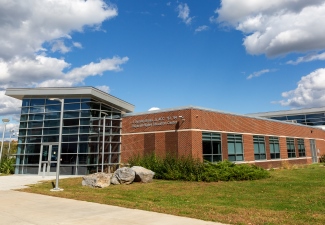Genetics Lab Acquires High Tech DNA Sequencer
PLATTSBURGH, NY __ Did you know that coyotes in the Adirondacks have become bigger
and more aggressive? Could it be the result of coyotes mating with bigger wolves native
to the region?
 Researchers in the Department of Biological Sciences at the State University of New
York College at Plattsburgh are studying coyotes to try to determine reasons for the
increase in their size.
Researchers in the Department of Biological Sciences at the State University of New
York College at Plattsburgh are studying coyotes to try to determine reasons for the
increase in their size.
Dr. Nancy Elwess, associate professor of biological sciences, is using a newly acquired LI-COR DNA sequencing system to study 40 to 50 tissue samples from the region's coyote population. Elwess said the new piece of high tech equipment should provide evidence for the theory that the coyotes are mating with wolves.
SUNY Plattsburgh is one of four colleges and universities nationwide to be awarded a LI-COR(r) Biosciences Genomics Education Matching Funds (GEMF) grant. The GEMF program provides funds to purchase the $90,000 DNA sequencing system and software, which will also be used by undergraduates at SUNY Plattsburgh studying molecular biology and related fields.
"This particular grant program helps colleges and universities compete for awards," said Jackie Potts, LI-COR(r) GEMF Program coordinator. "Colleges were evaluated on how they will incorporate the LI-COR(r) DNA analysis system into their curriculum as the main criteria for the award process."
The DNA sequencing system and software is a powerful tool in the studies of population genetics, genotyping, gene mapping, linkage analysis and phylogenetic relationships. The system is used in academic labs worldwide for a variety of research applications including sequencing, microsatellites and reverse genetics research.
Students and Faculty Involved in Research Projects
The coyote research project is just one of a number of projects student researchers are or will be involved in.
The DNA sequencing system is being used in six different research projects headed up by Elwess and Dr. William Deutschman, assistant professor of chemistry at SUNY Plattsburgh. These projects feature collaboration between faculty members and students across the SUNY Plattsburgh campus and beyond, including Cornell University.
"DNA barcoding is the latest and hottest area in genetic research," said Elwess, who was co-author of the grant proposal to LI-COR(r). "With the new DNA sequencer, we're starting with local applications, including the study of brook trout, bumblebees and coyotes."
Elwess is also collaborating with Dr. Timothy Mihuc, associate professor of earth and environmental science and coordinator of the Lake Champlain Research Institute, and his students on a study involving the genetic fitness of Adirondack brook trout through a catch and release program.
Another project benefiting from the DNA sequencer is a study comparing Upstate New York bumblebees to those from Vermont. This project involves collaboration between Elwess and Dr. Daniel Vogt, professor of biological sciences.
"The DNA sequencer will truly benefit our students," said Elwess. "For one thing, it will give them an advantage when it's time to go to graduate school. They are learning on the latest and greatest piece of equipment in this type of research. By the end of the academic year, we envision the new sequencer will have an impact on at least 300 students, including those students in biology classes and those working on research projects."
College Curriculum to Incorporate DNA Sequencer
In addition to being used for research, the DNA sequencer system will be incorporated into the curriculum of several classes this fall including "General Genetics," "Molecular Genetics," and "Biochemistry."
Elwess and Sandra Latourelle, adjunct faculty member of biological sciences and co-author of the LI-COR(r) grant, traveled to Nebraska in August for advanced training on the DNA sequencer system and software.
"It was very intense," said Latourelle. "But we learned a lot."
LI-COR(r) sent technicians earlier in the summer to set up the sequencer at SUNY Plattsburgh and to train four people on the system. The four individuals trained were Elwess, Latourelle, Deutschman and Michele Snyder, assistant professor of mathematics and science at Clinton Community College.
"We thought inviting a faculty member from Clinton would be a good neighbor gesture," said Latourelle.
Added Elwess, "Some of her students will most likely transfer into our program in the future, so it's important that she is familiar with this powerful research and teaching tool we have here."
--30 --
News
SUNY Plattsburgh, NCCC Announce New Admissions Initiative

SUNY Adirondack Students Benefit from New Dual Agreement with SUNY Plattsburgh Queensbury
